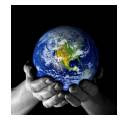
A few weeks ago I attended in the first ever Behavior, Energy and Climate Change conference, hosted in Sacramento, CA, by the American Council for an Energy Efficient Economy, the Precourt Institute for Energy Efficiency at Stanford University, and the California Institute for Energy and Environment at the University of California.
The conference, which sold out at 500 participants, focused on the work that so many of us do, without really knowing that we do it: figuring out what it takes to get people to change their use of, and attitude toward, energy. It turns out, that while many organizations and government entities spend their time on the front lines working through trial and error to implement programs that promote and encourage behavior changes, that there is a burgeoning scientific community spending their time studying what actually works and what doesn’t in terms of getting people to care about energy use and conservation, and the impacts of climate change.
Several universities and think tanks are using quantitative and qualitative research to refine messages and strategies targeted at encouraging individuals and communities to be more aware of the energy they are using and to reduce consumption. They're finding out some very interesting things about what motivates us to change.
We all know, at least on an intuitive level, that change can be perceived as risky, threatening and confusing; in other words, unwelcome and something to be avoided. Moreover, addressing global warming may seem like an insurmountably huge task, and many of us may believe that our individual actions won’t make a difference. As a result, countless people choose to do nothing. However, what scientists have learned is that even small changes can make a big difference.
Sure, we’ve been hearing environmental organizations say such things for years. But now there is research to back it up.
Swapping out one incandescent light bulb for one compact fluorescent won’t eliminate enough greenhouse gas emissions to save a polar bear. But what it will do is lead by example. Research has shown that our neighbors and friends are much more likely to take similar steps – and are even likely to attempt to “one-up” our own green measures – if they see that those around them have made those changes. This makes your one compact fluorescent turn into one or two in every house on your street, which turns into one or two in every house in your town, and so on. Therefore, if you make positive changes- even small ones- those around you are likely to make those positive changes as well, giving your small actions a huge multiplier effect.
So change is good… really good. Especially if you let your light shine and become a leader by example. We all know the famous quote by Gandhi “be the change you want to see in the world.” It’s more true perhaps than he even realized. Even small changes made by individuals can make a big, global difference.
To view the BECC conference program and presentations click here.
